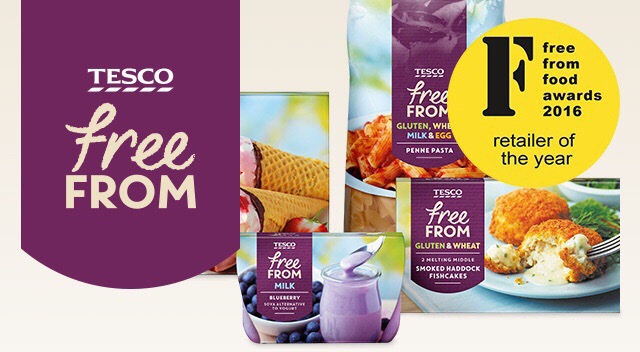Allergy-free food and beverage continues to drive the industry. These products do not contain allergens such as nuts, gluten, dairy, soy and/or eggs, and they are growing due to actual and perceived sensitivity, perceived health profile, and – soon – gut health and microbiome (more on that top trend on our upcoming Gut Health report). They also attract vegans, vegetarians and Paleo followers, and are expected to attract followers of the new diets that we will see rising as a result of personalized, gut-health related diets (including Ayur Veda and FODMAP variations).
In the UK, sales of “free from” products increased by 18.9% YOY to £ 772.2 million in 2016, according to Nielsen. Alpro, the alternative milk brand, represents £ 151.9 million, Lacto-free £ 49.2 million, and Nakd, the grain-free brand, £ 36.3 (source: ConvenienceStore, Dec. 2016).
UK’s leading retailers are growing the “free from” market, most notably with Tesco’s private label “Free From” line. According to Kantar (source: TheGrocer, Oct. 2016), Tesco and Sainsbury’s represent more than half of the UK free-from market, with value sales up 7.2% and 11.7% respectively.
According to Kantar, Morrison’s free-from sales climbed 62% during 2016 after the retailer doubled its free-from range at the beginning of the year, and launched a TV ad campaign to support its range. We find it most interesting that the company showcases more on the go/ snacking options, thus responding to 2 major “Stress Free” sub trends – “gut health” as well as “snacking”.
Recently, Morrison’a has revamped its allergy-free private label, and it has created shopper communication featuring a multitude of brands, in addition to its PL, to support and encourage shopper trial in this category.
The Co-Op, which recently lost its 5th largest supermarket position to Aldi, also invests in free from through both PL and shopper marketing:
(All supermarket Photos – Tesco, Co-op: cherished Volley Team member Gabi Goldenberg)
As for Asda, the retailer still has a long way to go on the “free from”, as the market does not necessarily need a price-based offer: the free-from products are not always sold at a high premium compared to regular products. We would advise a digital-based, added value offering.
The “Free From” is a sub-trend of the “Stress Free” trend as mentioned on our 2015 trends report. The Stress Free trend has since become a major trend in the consumer goods industry – also influencing the allergy free market and, as we’ve mentioned, will increase due to the rising awareness of gut-mind relationship and the advances in microbiome research, which we will cover on a separate report. We believe “free from” will change its face – but will continue to grow and increase in penetration by 2020.















